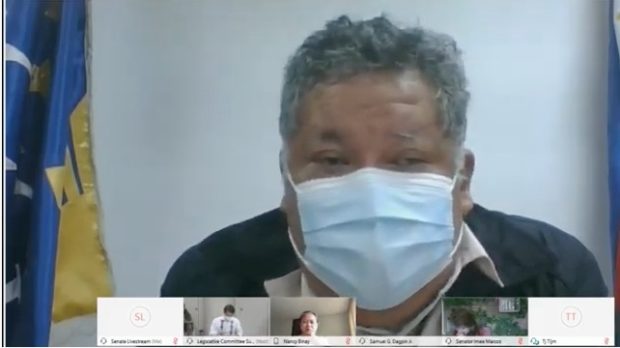Gatchalian questions subsidy to more than 70 poor performing GOCCs

Caption: GCG chairman Samuel Dagpin Jr. attends Senate hearing for 2021 proposed budget for GCG. /Screengrab from Senate livestream
MANILA, Philippines — Senator Sherwin Gatchalian lamented on Wednesday that more than 70 poor-performing Government Owned and Controlled Corporations (GOCCs) are still receiving subsidies from taxpayers.
In a Senate budget hearing for Governance Commission for GOCCs (GCG), GCG chairman Samuel Dagpin Jr. said that of the 118 GOCCs, only 34 passed while more than 70 failed the performance evaluation system (PES). PES is used to evaluate if the GOCC should be streamlined, privatized or abolished.
When asked about the penalty for corporations that failed the PES, Dagpin said underperforming corporations “will not receive performance-based bonus while their directors will not receive performance-based incentive.”
However, Gatchalian asked Dagpin: “Wouldn’t it be meaningful if we just abolish them since they are not performing anyways?”
Dagpin then responded that they will study the abolition of these underperforming GOCCs, noting that part of the process of abolition is to also consult the main department of the said corporation.
“That will be part of our study, your honor. We will continue to strive. Because based on the law for any privatization, merger, streamline, and reorganization, we are mandated to also consult the department or agency in which a GOCC is attached so that is based on our law,” Dagpin said.
“It is not only the authority of our GCG. It is really a supervising agency, guidance, that the GOCCs under them will be reorganized, streamlined, abolished or privatized,” he added.
The senator further clarified that he is not recommending the abolition of underperforming GOCCs but merely questioning why taxpayers are still subsidizing these corporations.
“I am not suggesting abolition. What I’m saying is, it is losing money. Obviously, capital is being eaten up and the Filipino people will have to fork out to sustain this so unless they make money, it is us the taxpayers will be subsidizing that,” he said.
Data from GCG showed that of the 118 GOCCs, 30 were approved for abolition, three were approved for privatization, while 25 were classified as inactive.
Of the 30 GOCCs, 12 were abolished due to their inability to produce desired outcomes, nine were abolished due to duplicative or overlapping functions while nine were abolished due to non-operation.































